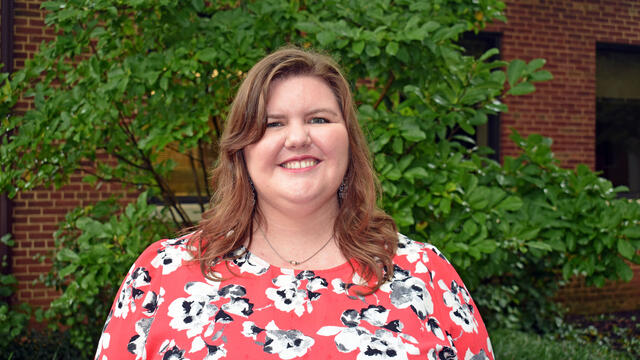Biology professor receives research grant from the National Science Foundation
Allison Kerwin, assistant professor of Biology, has received a three-year grant of $437,393 to study the effects of insecticides on jellyfish development and survival from the National Science Foundation (NSF) as part of the Building Research Capacity of New Faculty in Biology (BRC-BIO) program.

Allison Kerwin, assistant professor of Biology at McDaniel College, has been awarded a $437,393 grant from the National Science Foundation (NSF) for the project, “Effects of insecticides on survival and metamorphosis of the upside-down jellyfish, Cassiopea xamachana, and its symbiotic community.”
The three-year grant is part of the Building Research Capacity of New Faculty in Biology (BRC-BIO) program.
With the grant, Kerwin plans to study the effects of insecticides on jellyfish development. Her research is specifically aimed at upside-down jellyfish (or Cassiopea species) polyps that live in the Florida Keys, where mosquitos carrying the dengue virus can be found. While efforts have been made in the Florida Keys to reduce the mosquito population, there has not been research done on how insecticides can impact the life cycle of the jellyfish polyps and their survival, according to Kerwin.
Kerwin said, “The Florida Keys government has had a spraying program in place for many years that targets mangrove trees, which harbor mosquitos that could be carrying the dengue virus. Because the upside-down jellyfish live off of mangrove leaves, the insecticides could be having an impact on their development. My research will look at what effect the insecticides are having on their system overall with particular emphasis on the bacterial microbiome used during their transition from polyps to jellyfish.”
She also noted that because jellyfish and coral are closely related, her research could help uncover any effects the insecticides could be having on endangered Florida Keys coral species.
While Kerwin is currently in the initial planning stages of her research, she will be using $50,000 of the grant to purchase new equipment for McDaniel’s Biology department.
She expects that much of her research, which is anticipated to be fully underway by the summer of 2024, will take place on McDaniel’s campus with jellyfish polyps that she will be having brought in to live in her lab.
Kerwin plans to employ four McDaniel student interns over three summers, starting in 2024, to assist with her research. These students will receive funding at the Research Experiences for Undergraduates (REU) grant level since this is NSF-funded research, separate from McDaniel’s undergraduate student-faculty collaborative summer research program. She is also planning some trips to Florida with McDaniel student researchers.
Since joining the college in 2019, Kerwin has taught various courses in the Biology department, including Principles of Biology, Microbiology, and Marine Biology, among others. Her research is focused on the microbiome, including host-microbe and microbe-microbe interactions, bacterial genomics, and environmental impacts on marine symbiotic systems. She is also a mentor to students, stressing the importance of undergraduate research opportunities and encouraging students to pursue science careers.
She earned a bachelor’s degree in Biology from Smith College and a master’s degree in Marine Biology from Northeastern University’s Three Seas Professional Master’s Program. She also received a doctorate in Molecular and Cell Biology from the University of Connecticut. Prior to coming to McDaniel, she was a postdoctoral fellow at Pennsylvania State University.
The NSF’s BRC-BIO grant supports pre-tenured faculty in the biological sciences at institutions that traditionally do not receive significant NSF funding, including predominantly undergraduate institutions, minority-serving institutions, and others not among the nation’s most research-intensive institutions.